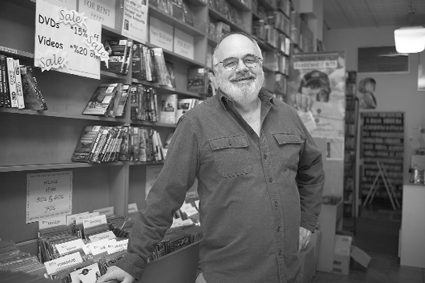By Rania Richardson
Local store hangs in by specializing in classics
By the crowds packed into Evergreen Video on Carmine Street after the blizzard in January, you wouldn’t know that the local home entertainment rental industry was in decline. “If we had snowstorms in July we’d be doing great business,” says owner Steve Feltes, who opened the store at its present location in 1996. Nothing is better for business than bad weather and the nesting instinct it encourages, so predictably, Evergreen had a banner weekend during the first blizzard of ’05.
“It was madness. People couldn’t even get through the front door,” says video store clerk Minnie Bennett, referring to the crowds of customers she had never before experienced. “It never let up.” Fellow clerk Adam Kuykendall, who was called in to lend an extra hand during the blizzard, adds, “People were fighting for titles.” He notes that the floor was completely covered with puddles from snow trailed in on boots. According to the two clerks, “Garden State,” “Collateral,” and “Napoleon Dynamite” were the top requested movies of the weekend, but television shows such as “24,” “Sex and the City,” “The Office,” and “West Wing” were also popular.
Unfortunately for the video rental business (which includes DVDs), bad weather can’t be counted on. “A whole lot of things are making business difficult now,” says Feltes, “There’s added competition for a person’s leisure time, such as video gaming and going on the Internet.” Skyrocketing rents for small business owners is another factor, in addition to the convenience of ordering via Netflix, an online DVD rental service that allows multiple rentals and no late fees— a model so successful that Blockbuster recently eliminated late fees in their stores.
One thing that keeps customers coming to a local video store is the human contact. Video store clerks tend to be knowledgeable and enthusiastic, ready to make recommendations or discuss films. Bennett and Kuykendall even include television shows in their pool of recommendations. Feltes estimates that 70% of his customers are in arts or communications, a figure gleaned through personal conversations.
Feltes began his career running film societies at the University of Minnesota. A stint managing a movie theater near the university and turning it into a repertory house was followed by work in film distribution in New York. A turning point came when he and a partner bought Abel Gance’s four-hour silent biopic, “Napoleon” and toured it across the country with a live orchestra. A partnership with Francis Ford Coppola’s company, Zoetrope, yielded them a large profit and Feltes parlayed the money into his present business — first a video mail order house, then a rental store at its original location on Houston Street across from the Film Forum.
Evergreen fills a unique niche with its extensive collection of foreign, independent, and especially classic films. Customers come in from Brooklyn, the Bronx, and New Jersey for the store’s specialized offerings. “We have the largest collection of American movies from the 1930s and 1940s — that’s where we’re strongest,” says Feltes. “I developed a clientele.”
George Cukor’s “The Women” from 1939 and Alfred Hitchcock’s 1943 “Shadow of a Doubt” and “Out of the Past” starring Robert Mitchum from 1947 are a few customer favorites. According to Feltes, the problem is that the studios do not seem to capitalize on this genre with a steady flow of re-releases. “For a long time there were two to three solid movies from the 1930s and 1940s coming out per month, but now there’s just a hodge podge trickle of older titles coming in,” he says.
The higher profit margins on DVDs is hastening the demise of video, forcing it to go the way of vinyl records. This is mixed news for Evergreen, because many customers are still interested in video. Feltes estimates that his customers request a ratio of 60% DVD to 40% video, it’s 80% to 20% for new releases.
“I get a lot of people coming in and looking for hard-to-find-stuff,” he says, referring to films that are not yet or may never be put on DVD. And there’s more bad news for local video stores: big box retailers such as Wal-Mart are driving the DVD business by packaging multiple films together and lowering their price point.
Despite the fact that last year’s “Lost in Translation” was the biggest money maker in Evergreen’s history, 2004 was one of the most difficult years the store has had. The confluence of negative factors affecting his business is not being counterbalanced with anything positive. Says Feltes, “I need to be a little tighter and a little sharper this year to keep my head above water.”





































